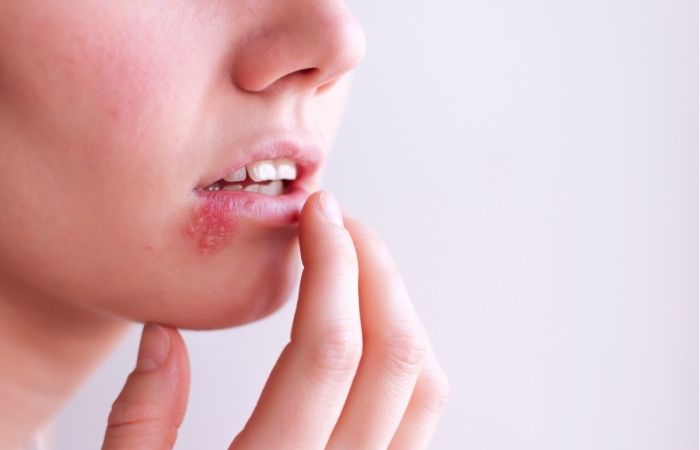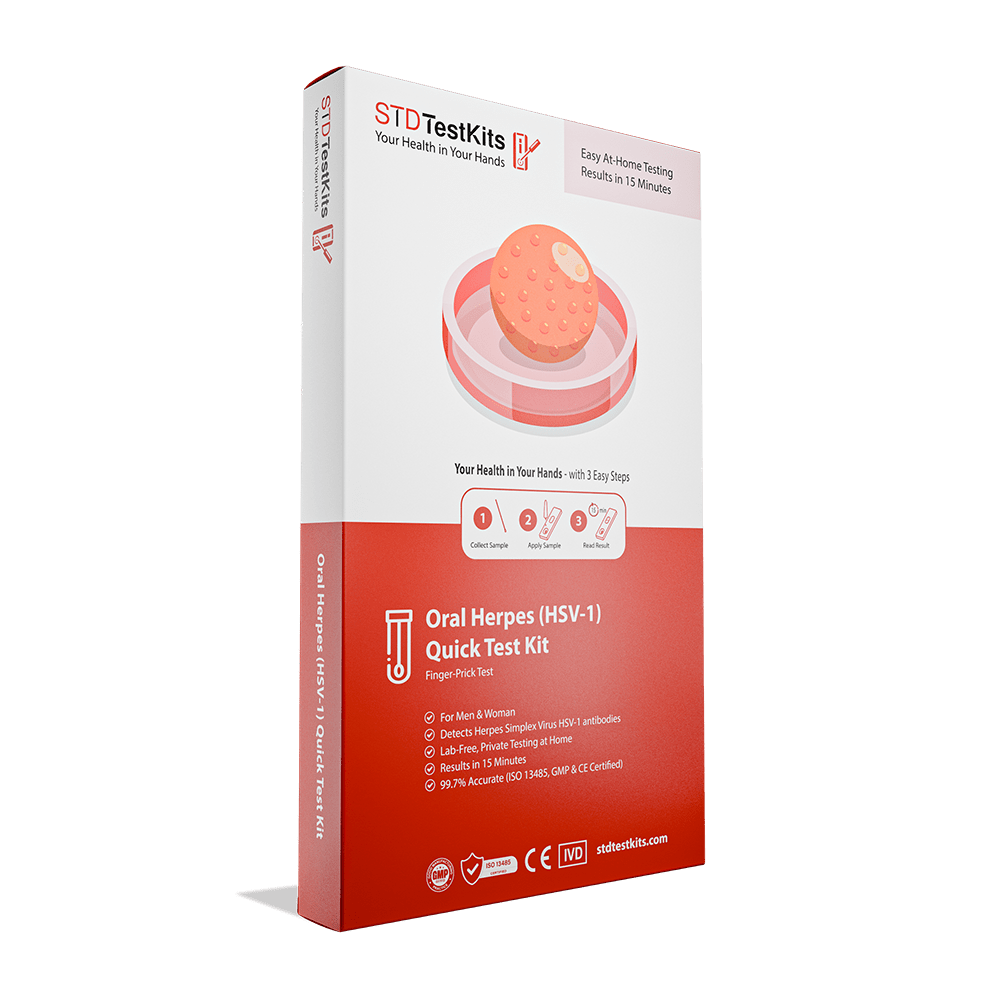Who’s Really at Risk? STD Testing Rates in Sex Work vs Everyone Else
Quick Answer: Herpes symptoms can include painful blisters, itching, burning, or no signs at all. Non-disclosure is a violation of consent that can harm both health and trust. Testing, disclosure, and treatment make herpes manageable, and dating still possible.
This Isn’t Just Razor Burn, And Here’s Why
It started with what I thought was an ingrown hair. A small bump, red and sore, showed up on my inner thigh a few days after we’d hooked up. I stared at it in the mirror, telling myself it was razor burn, maybe sweat rash. But the pain deepened, and within a day the bump blistered. That’s when panic set in.
Most people Google “herpes vs razor burn” or “STD bump or pimple” in this exact moment. The truth is, herpes often masquerades as something ordinary. According to the CDC, genital herpes can look like ingrown hairs, tiny cuts, or even skin irritation. Many people dismiss the first outbreak as nothing, and miss the window for testing or treatment.
My doctor didn’t dismiss it. After a quick swab, the results were in: Herpes simplex virus. While some cases come with fever, swollen glands, or burning urination, others are subtle or symptomless. That’s why so many people spread herpes unknowingly, or avoid disclosing it, even when they know.

People are also reading: Can You Get Chlamydia in Your Throat? Yes, Here’s What It Feels Like
“I Trusted Him. He Stayed Silent.”
Ellie, 27, met her partner through a dating app. After months of dating, she learned he had known about his herpes status for years. “I would’ve used protection, asked questions, maybe even stayed, but I never had the choice. His silence decided for me.”
“I kept thinking: this isn’t just about the virus. It’s about my right to know. He stole that from me.”
Ellie’s story echoes what researchers have documented. A 2016 study in the journal Sexually Transmitted Infections found that although 80% of people with genital herpes disclose to partners, those who don’t often cite fear of rejection as the reason. Silence may feel like self-protection, but it can cause lasting emotional harm to others.
When Silence Feels Like Betrayal
The virus itself is manageable, painful at first, yes, but treatable with antivirals, and not life-limiting. What really cut was the betrayal. Partners who withhold their herpes status rob the other person of informed consent. According to the American Sexual Health Association, disclosure delays transmission by months because it allows couples to use protection, time intimacy around outbreaks, and decide together. Silence erases that choice.
What many people don’t realize is that herpes disclosure is not just a “should I tell?” question, it’s a matter of ethics, consent, and respect. And when you’re the one finding out too late, the emotional wound can linger far longer than the physical outbreak.
The Numbers Don’t Lie, Herpes Is Everywhere
When I first heard the word herpes, shame wrapped around me like a chokehold. I imagined myself branded, unwanted, alone. But the data tells a different story. According to the World Health Organization, over 3.7 billion people under age 50 carry HSV-1 (the oral form, often spread by kissing), while nearly 500 million live with HSV-2 (the genital form). That means if you’re dating, especially on apps where hookups are fast and common, herpes is not the exception, it’s the rule.
Yet stigma makes it feel rare. A study published in the International Journal of Environmental Research and Public Health showed that people diagnosed with herpes often face mental health struggles more than physical ones, depression, anxiety, even suicidal thoughts, all worsened by the fear of rejection. The virus isn’t what isolates people. Silence and shame do.
Myth-Busting the Herpes “Scarlet Letter”
Here’s what I wish someone had told me sooner: herpes doesn’t mean you’re dirty, reckless, or doomed. Those myths live in outdated sex-ed classes and whispered gossip, not in science. Researchers have shown that with consistent condom use and antiviral therapy, the risk of transmitting herpes drops by over 50%. Add in honest disclosure, and couples can delay or even prevent infection for years (ASHA).
Another myth? That herpes ruins dating. The truth: many people date, marry, and have kids without ever passing it on. A Glamour feature followed people thriving in relationships post-diagnosis, proving that rejection is often the exception, not the rule. Stigma shrinks when we name it, and grows when we let fear take over.
What No One Tells You After the Hookup
The morning after a diagnosis, I sat on the floor of my bathroom, scrolling furiously. “How long does a herpes outbreak last?” “Can herpes look like a cut?” “Do I have to tell every future partner?” The questions were endless, and the shame was suffocating. But as I dug deeper, I found the real answer: herpes is common, it’s manageable, and disclosure is the key to living without the constant fear of exposure.
In one UK study published in the International Journal of STD & AIDS, people admitted they delayed disclosure until they felt safe, sometimes after multiple sexual encounters. It’s not because they’re malicious; it’s because stigma has made herpes feel like a relationship death sentence. But withholding isn’t protection, it’s betrayal.
“I thought I was sparing him,” one woman in the study said. “In reality, I was stealing his choice.”
When Silence Becomes the Loudest Part of the Story
My silence used to roar. I avoided saying the word “herpes” out loud, even to myself. I imagined the faces of men recoiling, dates ending mid-drink, phones going silent after the first text disclosure. And yes, that happened once or twice. But then something shifted: I realized the people who ghosted me weren’t partners worth having anyway. The ones who stayed, the ones who asked questions, held my hand, wanted to learn, those were the partners who mattered.
Disclosure is a filter. It weeds out those unwilling to deal with reality and draws in those strong enough to hold it with you. And that, in a strange way, is herpes’ unexpected gift. The virus may linger in your body, but the stigma only lingers if you let silence win.

People are also reading:My Partner Has HPV. Am I at Risk, And What Should I Do Next
Rewriting the Script: Sex-Positive Survival
I used to whisper the word herpes under my breath, like it was something obscene. Then one night, over wine and takeout, I finally told a new partner. My chest was pounding, my palms slick with sweat. He leaned back, paused, and then shrugged. “Thanks for telling me. So…do we just use condoms and avoid sex during outbreaks?” Just like that, the ground steadied. Disclosure wasn’t a confession; it was collaboration.
Moments like that are happening everywhere. Self Magazine notes that disclosure often goes better than expected. Most people respond with curiosity, not cruelty. And when framed as part of responsible intimacy, herpes becomes less of a barrier and more of a checkpoint, just like asking about STI tests, contraception, or boundaries.
Prevention Isn’t Perfection, It’s Protection
Here’s the truth: no prevention method is flawless, but that doesn’t mean you’re powerless. Daily antiviral medication like valacyclovir can reduce transmission risk by nearly 50%. Condoms, while not covering all skin-to-skin areas, still cut risk significantly. And paying attention to prodrome, the tingling, itching, or burning that often signals an outbreak, is crucial. Skipping intimacy during those times is one of the simplest, strongest protective measures.
Testing plays a huge role, too. Many people never get diagnosed because herpes isn’t always included in standard STI panels. At-home options like the 6‑in‑1 At‑Home STD Test Kit give you privacy, speed, and the ability to know your status before you pass it unknowingly to someone else.
Picture this: you’re at a dim café, your latte cooling between your hands. You’re three dates in, laughter comes easy, and you know the conversation about intimacy is near. You take a breath.
“There’s something I want you to know. I have herpes. It’s managed, and I take precautions, but I want to be honest with you.”
You wait. Their brow furrows, not in disgust, but in thought.
“Okay,” they say, nodding. “Thanks for telling me. I appreciate your honesty.”
Relief floods in. The night goes on. This is how disclosure can look. Not cinematic heartbreak. Just humans, talking.
The Science of Saying It Out Loud
Disclosure feels like standing naked in front of someone fully clothed. Vulnerable. Exposed. But studies show that speaking up changes the outcome. A paper from James Madison University revealed that when people disclosed early, partners were more likely to accept, respect, and adapt. Silence, on the other hand, increased relationship tension and self-blame. In short: naming it reclaims power.
And it’s not just about your partner, it’s about you. Carrying the secret is heavier than carrying the virus. Letting it out is an act of self-care, proof that you value your own wellbeing enough to risk rejection. And when rejection happens? That’s not proof of your unworthiness, it’s proof that the other person wasn’t ready for the kind of honesty real intimacy requires.
Living with herpes isn’t about lowering your standards, it’s about raising your boundaries. You deserve partners who respect consent, who show up for conversations about protection, who know that sexual health is a shared responsibility. Sex is still yours to enjoy. Dating is still yours to pursue. Parenthood, pleasure, love, all of it is still on the table. Herpes is one part of your story, not the end of it.
FAQs
1. Can herpes really look like something else?
Oh, absolutely. The first time I saw mine, I swore it was razor burn from a cheap blade. Other people mistake it for an ingrown hair or even bug bites. That’s the tricky part, herpes wears disguises. The only way to know for sure? Get tested. Don’t let Dr. Google drive you mad.
2. Do I have to tell every partner?
Yes, if you’re going to be sexual with them. Think of it less as a shameful confession and more like telling someone you’re allergic to peanuts, it’s information they need to make safe choices with you. And honestly, disclosure filters out the people who aren’t mature enough to handle real intimacy.
3. What if they walk away?
Then they weren’t your person. I know that stings, but imagine finding out two years in that your partner can’t hold space for tough truths. Better to know early. Plus, you’d be surprised, many people respond with, “Thanks for telling me. What does that mean for us?”
4. Is herpes really that common?
More common than you think. WHO estimates billions (yes, with a “b”) carry HSV-1, and hundreds of millions carry HSV-2. Translation: if you’ve kissed, dated, or had sex, you’ve already been around herpes. You’re not some rare case, you’re human.
5. Will this ruin my sex life?
No. Your sex life might get a little more thoughtful, condoms, conversations, maybe paying attention to your body’s signals, but it doesn’t end. Some people even say it made their sex life better because it forced them into honest, vulnerable talks that deepened connection.
6. Can I still have kids?
Yes. People with herpes have babies every day. Doctors just monitor more closely, especially during delivery, but herpes doesn’t take away your future family. Don’t let anyone scare you into thinking otherwise.
7. What about symptoms, do they last forever?
Outbreaks tend to calm down over time. The first one is usually the worst. After that, they’re shorter, less intense, and sometimes they disappear altogether for months or years. Many people live long stretches without any flare-ups at all.
8. Do antivirals actually help?
They do. Daily meds like valacyclovir lower your chances of passing herpes on and make outbreaks shorter and less painful. Some people only use them when they feel a flare coming, others take them daily. It’s about what works for your lifestyle.
9. What if I never tell anyone?
Keeping it secret might feel easier, but it’s way riskier. I’ve met people who carried that silence for years, and it wore them down more than the virus ever did. Disclosure isn’t just about protecting partners, it’s about protecting your peace of mind.
10. Is herpes dangerous?
For most healthy adults, no. It’s inconvenient and sometimes painful, but not life-threatening. The real danger is the shame spiral people fall into. That’s what steals joy. Once you break that cycle, herpes just becomes one small piece of your story, not the headline.
You Deserve Answers, Not Assumptions
Herpes is not the end of your dating life. It’s not a scarlet letter, and it’s not proof that you made a mistake. It is one of the most common viral infections on the planet, and the truth is, the stigma surrounding it causes more suffering than the virus itself. What happened to me, what happens to so many others, wasn’t just about blisters or burning. It was about trust broken by silence. The real healing began when I stopped letting stigma dictate my story and started owning my truth.
You still deserve love, intimacy, pleasure, and partnership. The first step is to learn: get tested, find out your status, and talk about it. The second step is to be kind to yourself and others. Being quiet hurts. But being open and honest about things can change relationships and keep your heart and health safe.
Sources
1. WHO: Herpes Simplex Virus Fact Sheet
2. Sexually Transmitted Infections Journal: Determinants of Disclosure
3. International Journal of Environmental Research and Public Health: Psychological Impact of Herpes
4. American Sexual Health Association: Herpes and Relationships







